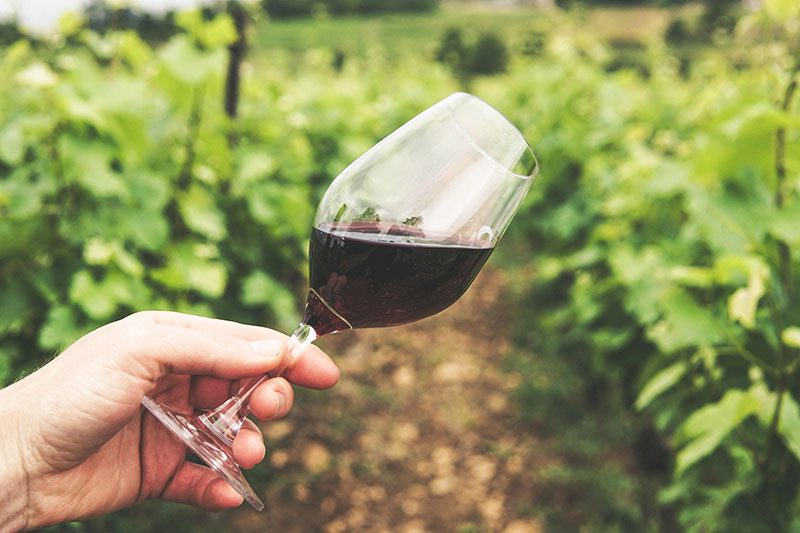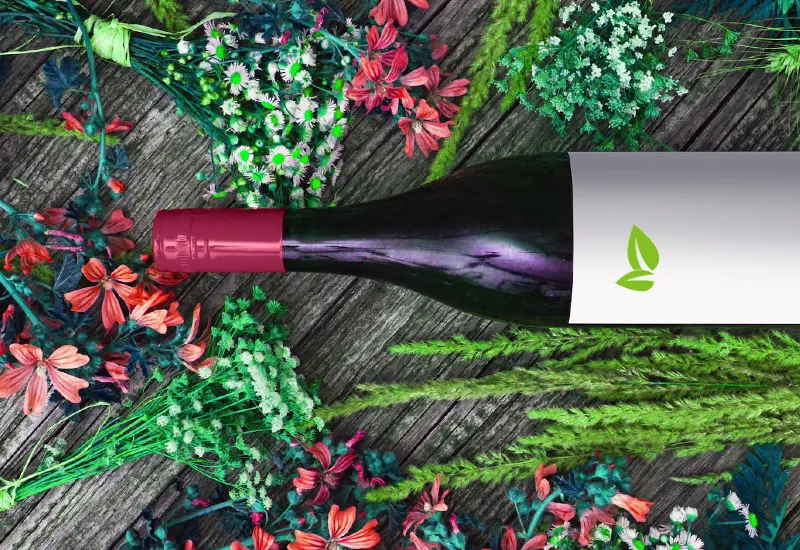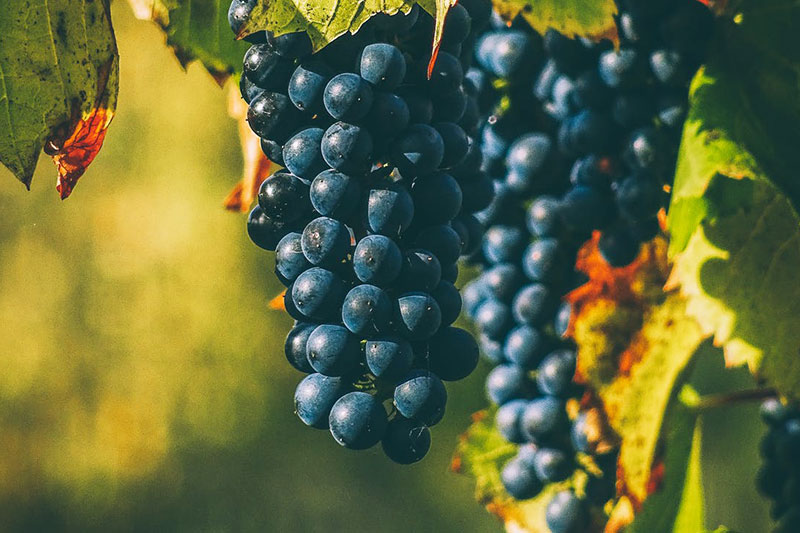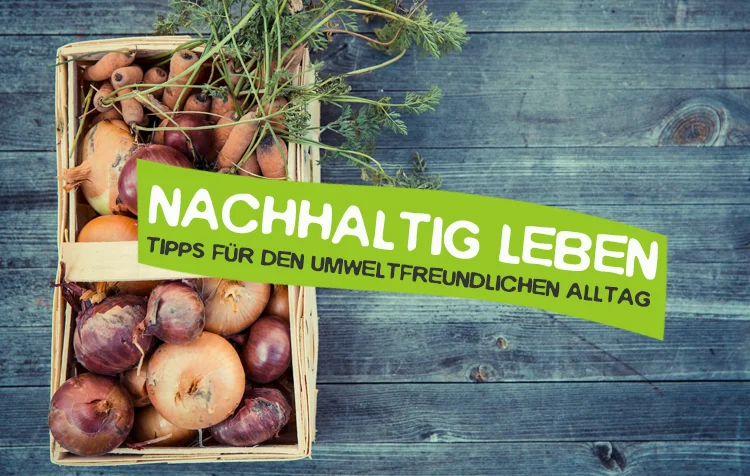Have you also heard that a wine should not be vegan? In fact, even if the wine is made from grapes, it is not always exclusively of vegetable origin. This is not due to the cultivation or the insects that could accidentally come to harm during the harvest, but mainly due to traditional production processes in the winery.
In this article, I would like to show you why wine today is usually not vegan and often not even vegetarian. In addition, you will learn how you can recognize 100 percent plant-based wines and continue to enjoy the noble drops even as a die-hard vegan. I'll also give you a list of vegan red wines, white wines and rosé wines to go with it. Let's go!
Here you can find a short overview in advance:
Why wine is not vegan - at least not most of the time!

Until the grapes end up in the wine cellar, the production process is generally still vegan. But this changes as soon as the winemakers use casein, egg white, lysozyme, albumin, swim bladders from fish or gelatine for wine clarification. animal products - use to remove suspended solids from the wine after fermentation.
If the wine is clarified with gelatin - a collagen found, for example, in the skin, rinds, bones or connective tissue of pigs or cattle - it is not even vegetarian.
Good to know: Yeasts are also necessary for the fermentation of the wine. However, these belong to the fungi and are therefore vegan.
Animal additives in wine production
So, among other things, have also Cows, pigs or Fish like sturgeon or catfish to suffer from it, if you prefer wines produced according to ancient tradition. But why exactly are the animals or their body parts used in wine production at all?
Before we get straight to the alternatives, I would like to explain the use of animal substances in the production of wines in a little more detail:
- CaseinCasein is obtained from boiled milk and used by winemakers to remove turbidity or a slight vinegar tinge from white wines. Even if the casein usually remains only in a small proportion in the final wine, this is ultimately vegetarian but not vegan.
- Egg white: Protein is used in the clarification process. Globular proteins (albumins) contained in it give the wine a milder note. The albumen also contains the enzyme lysozyme, which prevents rapid acid degradation in the wine. It settles to the bottom during the production process, so it is usually not present in the wine bottle sold, or only in small quantities.
- Gelatin: Gelatin, usually obtained from pork rinds, is also used to remove turbidity and from the wine. After the gelatin has bound these larger particles and sunk to the bottom, the clearest possible wine can be skimmed off. The use of gelatin, however, does not make the wine suitable for vegans or vegetarians.
- Fish bubble: The swim bladder, often used by sturgeon and specially prepared for wine production, is also intended to clarify unwanted turbidity from the wine. This insert is also not vegan and not vegetarian.
Notice: The glue of the wine labels is also often (strictly speaking) not vegan, as it contains casein glues. The same applies to the cardboard of the bottles. To find out more about this, you usually have to ask each supplier separately. At some point, however, one knows the brands that are animal-friendly and the producer:s that produce exclusively vegan wines.
Advantages: Why prefer vegan wines?
There are many, good reasons to live vegan. These are of a health-related, ecological and above all animal-ethical nature.
Here I would like to explain to you now briefly and briefly, Why I personally remain consistent also in the selection of wines and wines that are not produced with the help of animals.
- Animals: The main motive is animal ethics. Animals are sentient beingslike you and me. They have done nothing to us and do not deserve to be exploited for our purposes.
- Quality: Wines produced with plant-based adjuvants still taste just as (good) as wines that are to some degree of animal origin. Whether dry, semi-dry, off-dry, sweet or sweet. All flavors and also all grape varieties can be transformed into unique wines without animals - with high quality and at usual prices.
- Health: For example, fish proteins may still be present in the wine in extremely small quantities. Accordingly, people who are highly allergic to fish should definitely prefer vegan wines.
- Environment: The "animal detour" is extremely resource-intensive and contributes significantly to the biggest environmental problems of our time with, such as the Climate Change or the Deforestation of the rainforests.
- Well-being: The taste is the same - only the animal suffering ends when you consciously switch to plant-produced red, rosé and white wines. Those who truly love animals simply no longer have any moral justification for drinking classically produced wines. The switch brings values and actions into harmony and feels good.
And why should winemakers offer their wines vegan? For the reasons mentioned - but above all also because one reaches the constantly growing target group of vegan living people with the own products and shows itself adaptable.
How are vegan wines made?
First of all, a wine is vegan if it has not been "traditionally" prepared with egg whites, gelatin or swim bladders, but only with vegan fining agents.
Vegan wines, for example, are made with vegetable proteins from Potatoes, beans or peas which also bind turbidity at the bottom. Also Activated carbon, inorganic gelatin or the mineral earth Bentonite, is used for this purpose.
There is no difference in taste - and the production with the mentioned, vegetable proteins is not more expensive for the winegrowers than the conventional production with animal auxiliary materials.
How can I tell if wine is vegan or not?

Phew, lucky you! Veganer:innen do not have to do thus without wine! But how do you recognize the appropriate wines? After all No manufacturer obligation for labeling the use of gelatin or fish bladders on the wine label.
Here, I'll give you some tips to make choosing for your next wine night with friends and family a little easier.
Advertising in trade
Many winemakers:inside advertise quite aggressively with the sales argumentthat their wine is vegan. With the corresponding wines you can then be sure that their ingredients - the vegan lifestyle according to - are purely vegetable.
Wines with vegan label
Otherwise, in the meantime also helps the well-known and conspicuous, yellow-green V-Label/Vegan Label, which adorns the labels of many wines and other products. Also the Vegan flower provides a corresponding hint.
However, it is important to know that the wines that do not carry this label can still be vegan. Because not all wineries attach importance to the quite expensive certification - and some Winzer:innen have confirmed to me even on inquiry that they would have fear that Konsument:innen could be deterred by the term "vegan".
Tip: A vegan wine is often but not automatically an organic wine. That's why you should take another look the next time you want to treat yourself to an animal-friendly AND organic wine.
Labels in organic and supermarkets
In more and more supermarkets you can also find Price tag recognize which wine has definitely been produced without animal aids. Besides the price tags also support separate label with the inscription "vegan in the selection of wines. More and more often there is even a special Shelf with the in-house range of vegan wines.
Check with the manufacturer
And what can you do as a consumer if neither advertising nor labels and other markings in the market help? Then you can always ask. For example with the sales staff, but ideally directly from the producers. Even if the respective, favored wine is not vegan then, you have at least increased the probability for it to be produced vegan promptly by your demand.
With each passing day, more wine producers will make their production purely plant-based and label their products accordingly. So recognizing or finding vegan wines is getting easier and easier!
Which types of wine are definitely vegan?

There are many wines that are not vegan. But fortunately, more and more of them exist that are produced without gelatine, fish bladders & Co. Here I would like to introduce you to some of the hundreds of purely plant-produced wines that you can in classic supermarkets and organic markets in Germany.
What vegan wine would you recommend to your friends? Feel free to write me a comment below this post with any other suggestions.
Vegan red wines
- Organic grape Merlot (red wine, e.g. at REWE)
- Chianti Classico DOCG 2014 (red wine, e.g. at denn's Biomarkt)
- Sontino Sangiovese (red wine, e.g. at Real)
- Organic Rheinhessen/Pfalz Regent QbA (red wine, e.g. at Aldi Nord)
- Stellar Organics Merlot (red wine, e.g. at Veganz)
- Käfer Organic & Vegan Nero d'Avola DOC (red wine, e.g. at Lidl)
- Wine hawkmoth Regent medium dry (red wine, e.g. at Kaufland)
- …
Vegan white wines
- Organic Vine Chardonnay (White Chardonnay, e.g. at REWE)
- Landlust Rivaner & Pinot Blanc (White Burgundy, e.g. at REWE)
- Organic Pinot Grigio (white wine, e.g. at Edeka)
- Alnatura Edition Organic La Mancha Blanco (white wine, e.g. at Alnatura)
- BIOBIO Trebbiano d'Abruzzo DOC (white wine, e.g. at Netto)
- Alnatura Edition Organic La Mancha Blanco (e.g. at Alnatura)
- Organic white wine Airén La Mancha Y Macabeo (white wine, e.g. at Aldi Nord)
- Camino Tinto Airen (e.g. at Veganz)
- Organic Vine Riesling (Riesling, e.g. at Kaisers)
- …
Vegan rosé wines
- Organic Tempranillo Rosado (Rosé wine, e.g. at Penny)
- Sontino BioVegan Cabernet Sauvignon Rosato (Rosé wine, e.g. at Lidl)
- Organic Dornfelder Rosé (Rosé wine, e.g. at Edeka)
- Henkell Rosé (Rosé wine, e.g. at REWE)
- Freixenet Italian Wines Rosé (rosé wine, e.g. at REWE)
- …
More vegan wines
Not all wines can be found in classic supermarkets and organic markets. If you are in the mood for more special wines, I would like to give you a few recommendations, which you can all order here at Weinfreunde.de* can:
- Kesselring From a cast Rosé medium dry (Rosé wine)
- Wilker Pinot Blanc dry (white wine)
- Domaine Hipparion Côtes du Rhône Villages Visan (red wine)
- Touraine Sauvignon Blanc (white wine)
- Anniversario 62 Primitivo di Manduria Riserva (red wine)
- J. De Villebois Sancerre Rosé (Rosé wine)
- Rings The little cross dry (organic) (red wine)
- …
This list could of course be much longer. But the important thing is simply that you now know some vegan wines and know that even as a vegan:in you do not have to do without their wonderful, spicy, fruity or earthy taste.
Wine recommendation: Every now and then we also come across really cool vegan wine packages that are ideal for a cozy wine tasting at home. This wine package of fruity, vegan organic wines* you should definitely try in your family and friends.
Culinary combinations for the vegan wine evening

A good wine is usually enjoyed with a delicious meal. Now are most classic dishes to the wine yes unfortunately not vegan. Wine professionals recommend, for example, a Bordeaux with entrecôte, Chardonnay with lobster, Pinot with poultry or a Riesling with bread, cheese and sausage.
Nevertheless, nothing stands in the way of a vegan wine evening, of course. The wines should generally not too alcoholic, concentrated and lush, but rather light be. Especially sparkling wines, such as champagne and crémant are particularly well suited to vegetable dishes.
Here are some inspiring ideas for suitable, vegetable disheswith which you can enjoy your glass of wine.
Ideas for vegan snacks for wine tasting
- Vegan snack platter with garlic baguette and grapes
- Bread with vegan carrot salmon and arugula
- Vegan cheese skewers and olives
Ideas for vegan dinner with wine accompaniment
- Fresh asparagus with young potatoes
- Stuffed mushrooms with vegan block cheese
- Truffle pasta with vegan parmesan cheese
- Pizza with tomatoes, mushrooms and vegan cheese
- Potato gnocchi with red wine pears
Do you have any other great recommendations for your next vegan wine night? Then just write me a comment - and I'll add your tip to this list.
Why is the wine often not vegan?
When clarifying wine, winemakers often resort to traditional methods involving animals. After fermentation, casein, egg white, lysozyme, albumin, swim bladders from fish and gelatine in particular help to remove suspended matter from the wine.
What's different about vegan wine?
Vegan wines are not produced with the help of animal ingredients (such as gelatine or fish bladders), but with the help of vegetable proteins (e.g. from Potatoes, beans or peas) clarified.
Why drink vegan wine?
Vegan wine presupposes no animal suffering, protects the environment, is ideal for allergy sufferers and increases one's own well-being. And all this without having to sacrifice taste and quality.
Wine is not always vegan and vegetarian!

Maybe you've always wondered until now when someone told you that wine wasn't vegan. Now you know to what extent animals play a role in conventional wine production. Fortunately, that's slowly but steadily changing. But even as demand grows, so does the supply of animal-friendly alternatives: Wine is increasingly vegan, but not always.
As long as winemakers use gelatine, fish bladders and other animal fining agents in winemaking, vegans and vegetarians have to take a closer look when buying wine. After 2-3 purchases, however, you usually already know exactly what to look out for. And you also know your personal favorite wines, which the producers produce with absolute certainty without animal suffering.
Of course, it's even easier if you order from trustworthy sources that clearly declare their vegan ways. Very much to the heart I can recommend these vegan wines* from the wine friends.
"There is truth in wine; and with it one toasts everywhere."
Friedrich Hegel
I hope that I could help you with this article about vegan or non-vegan wines. Do you have any questions, further tips or would you like to recommend a purely plant-based wine? Then just write me a comment.
Be always kind to animals,

PS: You want to stop the exploitation of animals and the Stop factory farming? Then you will now learn in the linked article, how you can support this project every day!





Hello Christoph,
Thank you very much 😉
The question of what is not vegan about wine is asked very often.
After reading this beautiful article, you can answer them accurately.
Climate-friendly greetings,
Peer
Climate change ?? Now.
Hey Peer! Thanks for your feedback - always appreciated! 🙂
Many greetings,
Christoph